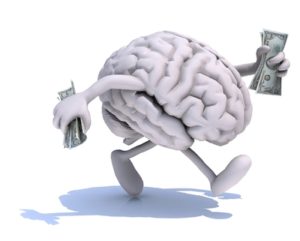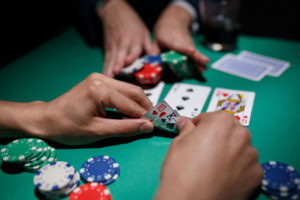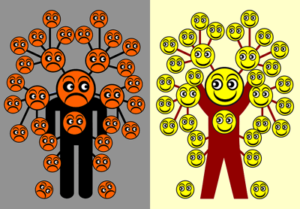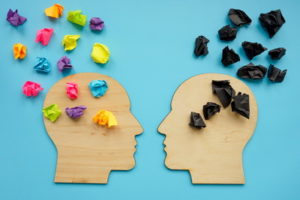 Poker is a game that is a blend of strategy and luck but if things were as easy as that it would not be anywhere near as close to as popular as it is today.
Poker is a game that is a blend of strategy and luck but if things were as easy as that it would not be anywhere near as close to as popular as it is today.
This is a game that requires mental agility to play which is why there are critical strategies for winning and plenty equations to remember.
There is also body language that needs decoding so you can see why memory power and the ability to retain information is such a crucial ability in a poker player’s arsenal.
Remembering The Odds
 A massive part of mastering poker is the maths involved with it. This will, or at least should, influence your initial decisions, based on the pot and card odds which will determining whether you decide to call, raise or fold. You will be constantly reviewing and revaluating these equations with new information after every bet.
A massive part of mastering poker is the maths involved with it. This will, or at least should, influence your initial decisions, based on the pot and card odds which will determining whether you decide to call, raise or fold. You will be constantly reviewing and revaluating these equations with new information after every bet.
Naturally, you will need to keep track of all of these equations which requires you to remember these to begin with. This skill can play a big role in whether you win or lose your poker game or not.
Remembering The Cards
 In Texas Hold ’em, remembering your hole cards can either make or break your game. If you can manage to keep track of the shown community cards on the table then you can make an educated guess on what hole cards your opponents might be holding.
In Texas Hold ’em, remembering your hole cards can either make or break your game. If you can manage to keep track of the shown community cards on the table then you can make an educated guess on what hole cards your opponents might be holding.
This is no easy skill as even remembering what your own hole cards are, which you can peek at any point, can get lost somewhere amongst the suits and numbers. Attempting to guestimate other people’s hole cards is a process of elimination but because you do not have a list of ticked off cards by suit and number on the table, you will need to be able to do all of the working out in your head.
However, all of this comes down to a matter of practice. Practice is critical when mastering poker so you need to repeatedly use equations in your game until they become impossible to forget, are second nature and you learn to figure out where cards are on the fly.
Remembering Your Opponent’s Tells
![]() A great deal of reading your opponent’s tells can be boiled down to your natural instinct. However, there is a method to the madness and we need to understand that method because this is the difference between calling a bluff and eventually winning or losing.
A great deal of reading your opponent’s tells can be boiled down to your natural instinct. However, there is a method to the madness and we need to understand that method because this is the difference between calling a bluff and eventually winning or losing.
You don’t just need to remember tells but also remember what combination of tells reveal you’re your opponent’s emotions might be. Does an eyebrow raise indicate panic or confidence? Not only that, but each player will tell differently so once again this information needs to be retained and properly utilised.
Be Careful Though
 Many poker players will agree and tell you that memories cannot be trusted which is something that a lot of psychologists would also agree on. All of the memories in your head are wrong and will have been affected by your mood at the time your brain recorded them. They are influenced by how you think of it since, how you are feeling at the point of recall as well as many other factors.
Many poker players will agree and tell you that memories cannot be trusted which is something that a lot of psychologists would also agree on. All of the memories in your head are wrong and will have been affected by your mood at the time your brain recorded them. They are influenced by how you think of it since, how you are feeling at the point of recall as well as many other factors.
A good example of this can be found in your own hole cards. Most poker players are sitting at the table, constantly looking at their hole cards even though they only looked at them 0.2 seconds earlier.
With so many other things you need to keep track of, you can easily get mixed up on what cards you’re keeping a hold of, or maybe you just don’t have full confidence in your own mind. Memory can be fickle and unreliable so having a strong memory is certainly an essential element of poker. It will help to improve your game but sadly that alone won’t make you a master of poker.
There are many other skills you will need to work on in order to win consistently at the tables. Also, if poker was entirely about memory we wouldn’t have so many veteran players winning as much as they do in their 80’s, like Doyle ‘Texas Dolly’ Brunson still does at nearly 90 years old.
Why The Mind Is Important In Poker
 It goes without saying, but poker is not a physical game. Poker is a mental game that relies on the mind, up there with chess and e-sports. Even if you are a player who looks after themselves and eats well and works out, the reasons you do have less to do with poker’s physical demands and more about taking good care of your mind to succeed in poker.
It goes without saying, but poker is not a physical game. Poker is a mental game that relies on the mind, up there with chess and e-sports. Even if you are a player who looks after themselves and eats well and works out, the reasons you do have less to do with poker’s physical demands and more about taking good care of your mind to succeed in poker.
This is one of the main reasons poker is such a fantastic game, just about anyone can become a great player. This is not the case with sports like football where the levels of speed, strength and coordination that are required to succeed at the highest level means that only a small fraction of those that play the game will ever go on to be great.
Many poker players assume that tilt and other factors were just part of the game and don’t realise that they are missing out on a big advantage. That perception is slowly changing, and the improvements players are making to their poker mental game are making a significant difference in the quality of their game. But, much like the game itself, the mental side of poker is always evolving.
At the end of the day, poker is all about the decisions we make and our decision making process relies not just on memory but also on focus, thinking, planning, perception and emotional control. A lack of focus can cause you not to pick up on the fact that your opponent rarely bluffs, where as a lack of awareness can cause you to miss out on some obvious tells.
Likewise, your memory may not have correctly remembered how an opponent played a similar spot an hour before. Success in this game depends on the quality of the decisions you make, and the better your memory is can help you avoid your most common errors.
